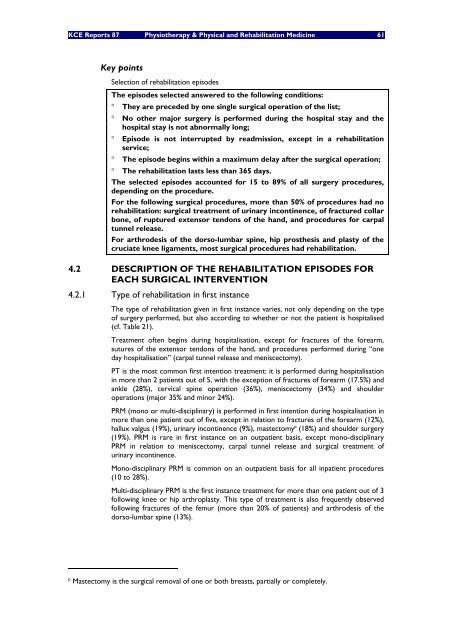Het gebruik van kinesitherapie en van fysische geneeskunde ... - KCE
Het gebruik van kinesitherapie en van fysische geneeskunde ... - KCE
Het gebruik van kinesitherapie en van fysische geneeskunde ... - KCE
You also want an ePaper? Increase the reach of your titles
YUMPU automatically turns print PDFs into web optimized ePapers that Google loves.
<strong>KCE</strong> Reports 87 Physiotherapy & Physical and Rehabilitation Medicine 61<br />
Key points<br />
Selection of rehabilitation episodes<br />
The episodes selected answered to the following conditions:<br />
° They are preceded by one single surgical operation of the list;<br />
° No other major surgery is performed during the hospital stay and the<br />
hospital stay is not abnormally long;<br />
° Episode is not interrupted by readmission, except in a rehabilitation<br />
service;<br />
° The episode begins within a maximum delay after the surgical operation;<br />
° The rehabilitation lasts less than 365 days.<br />
The selected episodes accounted for 15 to 89% of all surgery procedures,<br />
dep<strong>en</strong>ding on the procedure.<br />
For the following surgical procedures, more than 50% of procedures had no<br />
rehabilitation: surgical treatm<strong>en</strong>t of urinary incontin<strong>en</strong>ce, of fractured collar<br />
bone, of ruptured ext<strong>en</strong>sor t<strong>en</strong>dons of the hand, and procedures for carpal<br />
tunnel release.<br />
For arthrodesis of the dorso-lumbar spine, hip prosthesis and plasty of the<br />
cruciate knee ligam<strong>en</strong>ts, most surgical procedures had rehabilitation.<br />
4.2 DESCRIPTION OF THE REHABILITATION EPISODES FOR<br />
EACH SURGICAL INTERVENTION<br />
4.2.1 Type of rehabilitation in first instance<br />
The type of rehabilitation giv<strong>en</strong> in first instance varies, not only dep<strong>en</strong>ding on the type<br />
of surgery performed, but also according to whether or not the pati<strong>en</strong>t is hospitalised<br />
(cf. Table 21).<br />
Treatm<strong>en</strong>t oft<strong>en</strong> begins during hospitalisation, except for fractures of the forearm,<br />
sutures of the ext<strong>en</strong>sor t<strong>en</strong>dons of the hand, and procedures performed during “one<br />
day hospitalisation” (carpal tunnel release and m<strong>en</strong>iscectomy).<br />
PT is the most common first int<strong>en</strong>tion treatm<strong>en</strong>t: it is performed during hospitalisation<br />
in more than 2 pati<strong>en</strong>ts out of 5, with the exception of fractures of forearm (17.5%) and<br />
ankle (28%), cervical spine operation (36%), m<strong>en</strong>iscectomy (34%) and shoulder<br />
operations (major 35% and minor 24%).<br />
PRM (mono or multi-disciplinary) is performed in first int<strong>en</strong>tion during hospitalisation in<br />
more than one pati<strong>en</strong>t out of five, except in relation to fractures of the forearm (12%),<br />
hallux valgus (19%), urinary incontin<strong>en</strong>ce (9%), mastectomy p (18%) and shoulder surgery<br />
(19%). PRM is rare in first instance on an outpati<strong>en</strong>t basis, except mono-disciplinary<br />
PRM in relation to m<strong>en</strong>iscectomy, carpal tunnel release and surgical treatm<strong>en</strong>t of<br />
urinary incontin<strong>en</strong>ce.<br />
Mono-disciplinary PRM is common on an outpati<strong>en</strong>t basis for all inpati<strong>en</strong>t procedures<br />
(10 to 28%).<br />
Multi-disciplinary PRM is the first instance treatm<strong>en</strong>t for more than one pati<strong>en</strong>t out of 3<br />
following knee or hip arthroplasty. This type of treatm<strong>en</strong>t is also frequ<strong>en</strong>tly observed<br />
following fractures of the femur (more than 20% of pati<strong>en</strong>ts) and arthrodesis of the<br />
dorso-lumbar spine (13%).<br />
p Mastectomy is the surgical removal of one or both breasts, partially or completely.

















